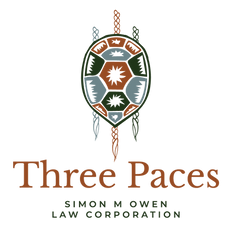(Re)turning the tables
- organicfriend
- Jan 24, 2022
- 3 min read
In response to my previous (admittedly quite abstract and gauzy) post, an eminently reasonable friend posed a familiar question: in what specific ways would Indigenous law lead to different outcomes, as compared to Canadian legal approaches?
On the one hand, this isn’t my question to answer; the practices of Indigenous law are ongoing within and among Indigenous peoples and places, and ought not to require proving to or recognition from anyone outside their appropriate scope of concern. I usually offer some general thought experiments to help people poke through the borders they’ve drawn around what ‘counts’ as law: imagine, say, a community that has learned to actualize the (quite objective) truths of inter-relationship and inter-dependence between humans and other beings. Imagine knowing – really knowing – that water is alive and that we – all of us – are only well in and through the wellness of water. Carry this truth into the hard decisions that have to be made around allocation, contrasting uses, competing needs (see here for a short reflection on this very topic). What might law look like through this lens?
Or imagine, perhaps, that kinship is a primary premise for one’s legal obligations and entitlements. Personal dignity, well-being, or a broad-based equity that is upheld across diverse roles and responsibilities could – and does – definitely exist in such spaces, but would necessarily require different kinds and ways of law than the atomistic ‘rights’ that individuals are presumed to wield within and against a deracinated state.
But while I tend to go no further into the internal workings of Indigenous legal orders than to defend their right to exist and evolve, the related matter of how Indigenous and state-based legal orders interact in practice (beyond the historical denigration or contemporary lip-service of the latter to the former) does merit sustained and widespread engagement. I’ve been posed variations of this question many times over the years, almost always by well-intentioned non-Indigenous folks who are curious (or downright concerned) about how legal pluralism – in particular with the mysterious manifestations of non-state, non-codified legal orders – could possibly co-exist. Visions of incoherence and conflict dance through their heads...
There’s no one answer, of course. But here’s one story from my time with ILRU. I was sitting with an Elder in a band office, close enough to the ocean that the North Pacific spray salted the clapboard walls. He was telling me about how the federal government – through the Department of Fisheries – had taken over – taken away – the fishing grounds that his kinship line had owned and maintained for untold generations. “Wouldn’t let us fish! Wouldn’t stop the big trawlers from taking them all, either!”. While the most explicitly racist and restrictive regulations had relaxed in recent years, the government, in his view, was still breaking his people's law, still assuming an authority to which it had no claim. We fast-forwarded in time a bit, to when, hopefully, legal title to these lands and waters had been regained. Would this restore lawful relations? He didn’t think Canada would ever get out of the governance business entirely – too many interests at stake now. Instead, he told me, the government had a lot to answer for – for how it had taken those creeks and fishing grounds for so long, for how it had so damaged the relationships that nurtured both fish and humans in his territory. “If [another Indigenous nation] had done that, well, short of war, they’d have a pretty big shame feast to put up. Canada talking about reconciliation? I won’t hear it, not yet. Let them come here, put up a shame feast for what they did”.
So, Canada. If you (if we) have any such feeling, there are laws – institutions, processes – principles – ready to receive it. Incredibly, the invitation to make real amends – to really reconcile – remains open. We just have to learn how to put up that feast. And again, and again. Indigenous legal orders are deeply capable hosts. Can we learn how to be decent guests?


Comentarios